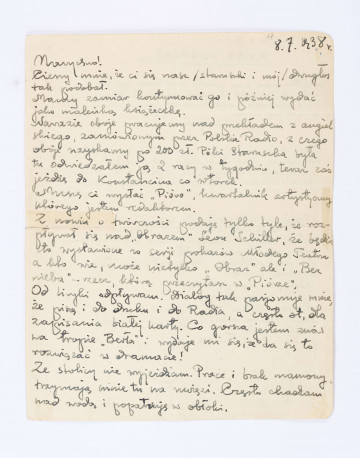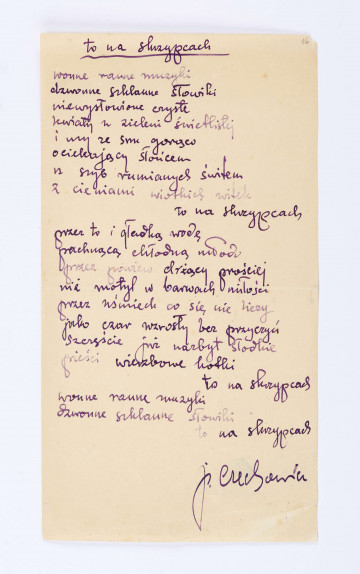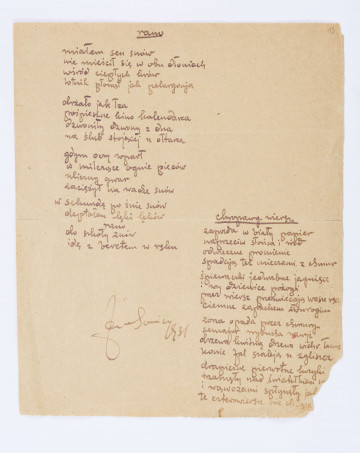
Letter to Maria Maćkowska-Wydrowa and the poem Pious Rhymes
1938
National Museum in Lublin
Part of the collection: Memorabilia related to Józef Czechowicz
The work was published in the volume Stare kamienie [Old Stones], and later in Poemat o mieście Lublinie [The Poem about the City of Lublin], which was a lyrical description of a night walk through the streets of Lublin. An important place on the trail of poetic peregrination is the castle and the castle chapel of the Holy Trinity, about which Józef Czechowicz writes: "[...] it is the treasury and heart of Lublin, the Jagiellonian city".
According to the poet, the castle chapel is "one of the most beautiful monuments in Poland". Czechowicz devoted a separate text to it: Kościół na Zamku w Lublinie [The Church at the Castle in Lublin], which was published in the "Lublin-Kresy Review" in 1925 (no. 4). In the article, the author draws attention to "the emptiness of the altars", "the strange abandonment of the church, which is rarely visited by anyone". He states: "After all, we are famous for not knowing what treasures are in our possession".
Czechowicz recalls the Lublin temple in yet another place. In the literary sketch Wyobraźnia stwarzająca [Imagination Creating], he describes a fresco located on the western wall of the nave of the Chapel of the Holy Trinity. According to the poet's description, it shows "an angel with spread wings at his shoulders, lion-faced and strong", who "turns his head towards a woman kneeling by him". Czechowicz writes: "She is petite, with a sweet profile, lifting a large jug in her hands. She is kneeling - but on what? Is it an angel's robe folded in anthropomorphic shapes? Or is it a cloud, with a sad, terrifying human face downwards and the heads of monstrous fish to the right? Does this bizarre dislocation of lines, this allusion to shape, not the shape itself, imagine the legendary Leviathan?". As a matter of fact, the "disturbing work" that fascinates Czechowicz does not depict a woman, but Habakuk, who - supported by an angel - floats, carrying food to Daniel imprisoned in a lion's den. In his sketch, the author recalls not only the extraordinary scene from the Lublin chapel, but also paintings by artists who shaped his painting imagination: Hieronymus Bosch and Peter Breughel. However, according to Czechowicz, "the most mysterious, the most creative is the Lublin fresco, where the creator's imagination unrealised the shape to such an extent that it ceased to be unambiguous".
Author / creator
Dimensions
cały obiekt: height: 14 cm, width: 21 cm
Object type
manuscript
Technique
manual script
Material
paper, ink
Creation time / dating
Creation / finding place
Owner
The National Museum in Lublin
Identification number
Location / status

1938
National Museum in Lublin

1939
National Museum in Lublin

1931
National Museum in Lublin
DISCOVER this TOPIC
National Museum in Lublin
DISCOVER this PATH
Educational path